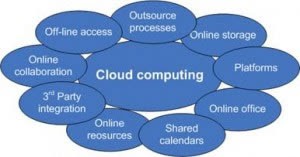While we have yet to see a major shift by larger companies to cloud computing, we do see more acceptance by smaller companies to move their computing environments to the cloud. With the growth of mobile devices such as smartphones, tablets and laptops, the movement of data and computing resources to the cloud looks like it’s only going to continue.
Advantages of Cloud Computing
- Inexpensive: Thin client or network computers that is used in a cloud computing environment is generally less expensive than fully loaded PC.

- Green: With a low-power chip and flash memory, thin client or a network computer use less power than fully loaded PCs with optical drive or hard drive.
- Easy to maintain: Because there are no optical drive or hard drive also means fewer moving parts, which means thin client or network computer is easier and less expensive to maintain.
- Easy to update: Software provided online is upgraded and maintained by the provider, so the small business owner does not have to purchase the newest version of a software program or download fixes and patches.
- Easy to implement: Cloud computing is very fast to implement to a number of workstations.
- The fixed cost: Cloud computing allows business owners to plan rather than be caught off-guard when a costly software or hardware upgrade must be purchased.
Potential issue with Cloud Computing
- Data Security: Since the cloud computing service is provided by a vendor, you will not have total control of your sensitive data so vetting of the vendor is very important to assure data security.
- Budget impact: Monthly payments for cloud computing never end. And ongoing cost of higher bandwidth demands increase in total cost as the cloud grows to accommodate company’s needs.
- Loss of control: Sometimes there are definite poor performance issues depending on the cloud computing service you use. And it is difficult to control what happens at the host’s location(s).
- Redundancy: Cloud hosting resides in a single data center which the vendor is using. Therefore, the business owner should check to make sure that there is redundancy of infrastructure to mitigate the risk of service stoppage due to system failure.
- Cost: The cloud gives businesses a hands-free method to scale their hosting; however, problems can arise that are financially costly. For example, automatic scaling can make people very lazy. If you are not paying attention to your usage, you just might get a huge surprise on your next bill. One thing that is a rising concern is that hackers can run up their victims’ hosting bills. One method that is being used by hackers is a simple low-level Distributed Denial of Service, which will not take your site down but will keep your server very busy. Since you pay for usage with cloud hosting, your costs can spin wildly out of control. So if you are using cloud hosting, you must pay close attention to your usage.
- Application performance: Your data might not be cloud-worthy. You should not put an application that provides competitive advantage or contains customer-sensitive information in the public cloud. Your application could be too big to scale. The bigger you are, the bigger your IT resource pool. And the bigger your IT resource pool, the less likely it is you will see any enormous financial advantage in outsourcing to the cloud.
- Need for human capital: If you do not have the proper staff internally who is able to spend time to learn new things, implementation of cloud computing can be very frustrating.
- Service level availability agreements: Since SLA agreements are very detailed, it is important to verify all the services being defined in the contract. It is also very important to understand the amount you are paying for the quality of services you are receiving.
- False promises: Every cloud computing service provider will promise to deliver your demanded services. However, the reality is they provide different levels of quality and services when it comes to actually delivering the service.